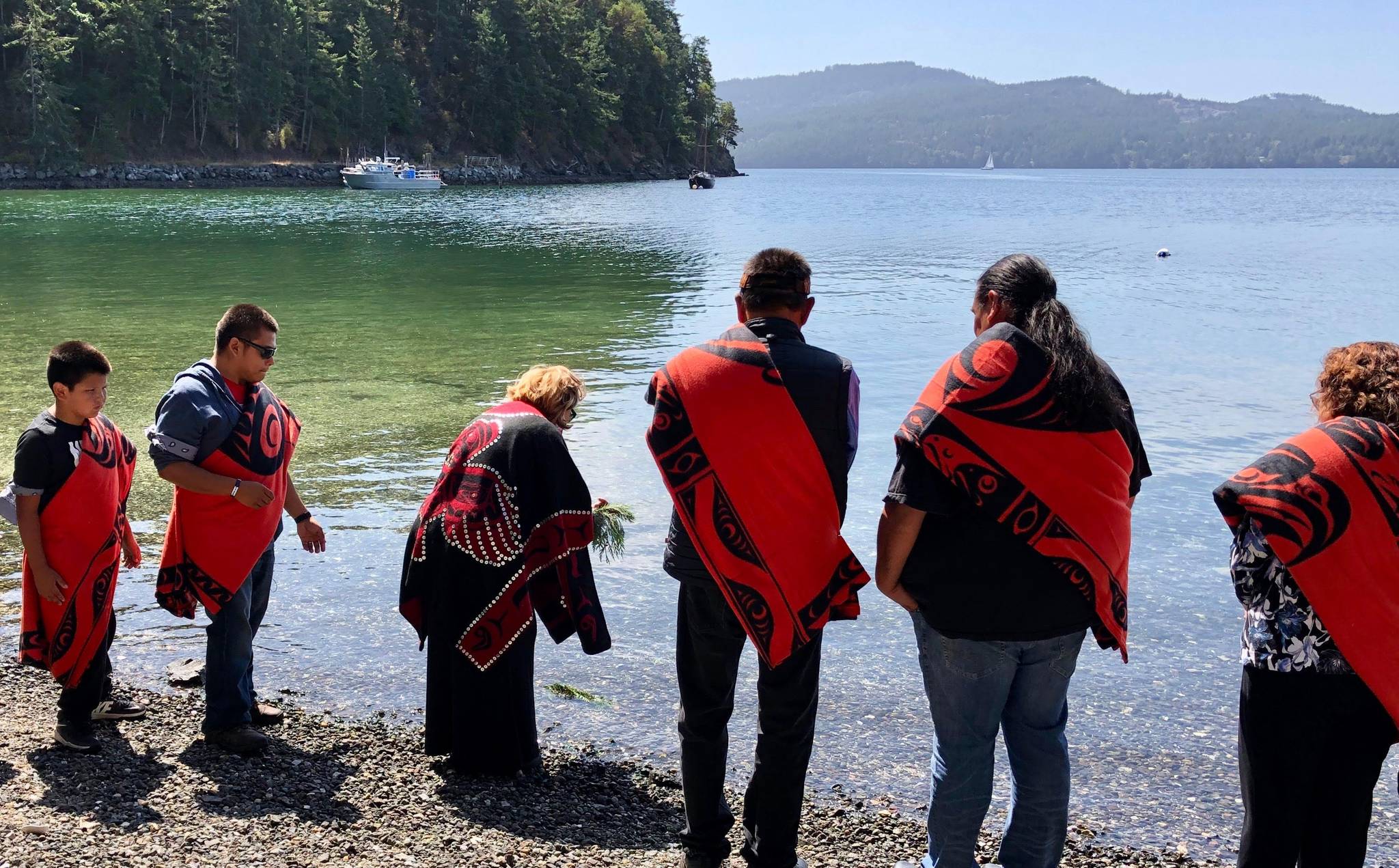Submitted by Friends of the San Juans
Lummi Nation held a Sna’teng, a traditional naming ceremony, for the Southern resident killer whale population on Thursday, Aug. 22, on a beach at H’eT’atCh’L, an ancestral village site on Orcas Island. Traditional names connect family members to one another, to ancestors, to culture, and to spirit.
In receiving the name Sk’aliCh’elh, the qwe’lhol’mechen (orcas) were affirmed as members of the Lummi family. “We call the orcas qwe’lhol’mechen, which means “our relations under the waves.”
“Now we can call those relations by their proper name, Sk’aliCh’elh,” said Lawrence Solomon, Secretary of Lummi Nation.
Standing as witnesses were Leonard Forsman, Chairman of Suquamish Tribe and President of the Affiliated Tribes of Northwest Indians; Chief Leah George-Wilson of Tsleil-Waututh Nation; Kevin Paul, Senator of Swinomish Tribe; and Rueben George, of Tsleil-Waututh Nation. The Chairwoman of the Tulalip Tribes was unable to attend, but sent her blessing.
Chairman Forsman said, “The Southern Resident Killer Whales are like us: they depend on these waters for their survival, for their well-being, for food and recreation, for their spirituality as well. What they need is more salmon, more clean water, less vessel traffic. They’re asking for the same things that we’ve been asking for.”
“What happens to them, happens to us. We’re out of balance right now,” Chief Leah George-Wilson said. “But I think we’re in a period of transformation: we are becoming what we’re supposed to be, and what we’re supposed to be is naut’sa mawt, one heart, one mind.”
During the summer, all three pods of resident orcas hunt for Chinook salmon in the inland Salish Sea. This summer, because of a lack of salmon, the orcas have been forced to look for food off the coast, and have made only brief appearances among the islands. On the Wednesday afternoon before the naming ceremony, J, K, and L pods were spotted off San Juan Island. On Thursday morning, the naming ceremony took place in proximity to them. By Thursday afternoon, they were gone again.
“They came in for their Sna’teng,” said Raynell Morris, a Lummi elder who took part in the ceremony. “That’s what family does. That’s what we all did today, Coast Salish Tribes and First Nations. We came together as extended family for spirit and culture. Our ancestors were here with us today. Sk’aliCh’elh came home for the ceremony, but then they had to leave right after because they are hungry. Healing our waters and restoring the salmon, that’s the work we need to do now.”
Sk’aliCh’elh is an ancestral place name from the Penn Cove area. The qwe’lhol’mechen individual known as Lolita and/or Tokitae who is being held captive at Miami Seaquarium was captured from the Penn Cove area in 1970. She was recently given the name Sk’aliCh’elh-tenaut. By giving J, K, and L pods the collective name of Sk’aliCh’elh, family bonds between the pods and Sk’aliCh’elh-tenaut are affirmed every time the names are spoken.
Also in attendance were representatives from Congresswoman Suzan del Bene’s office, the Army Corps of Engineers, Washington Department of Fish and Wildlife, Whatcom County Council, and Seattle City Council. Present, too, were the Executive Directors of the Sierra Club, Friends of the San Juans, and Sacred Trust Initiative.
Participants at the Sna’teng, a traditional naming ceremony, for the Southern resident killer whale population at H’eT’atCh’L, an ancestral village site on Orcas Island.
Lawrence Solomon, Secretary of Lummi Nation, will be speaking about our sacred obligation to protect Sk’aliCh’elh,” and the Salish Sea at the Friends of the San Juans Annual meeting at the Oddfellow’s Hall on Sunday, Sept. 22. To register visit Friends of the San Juans.



